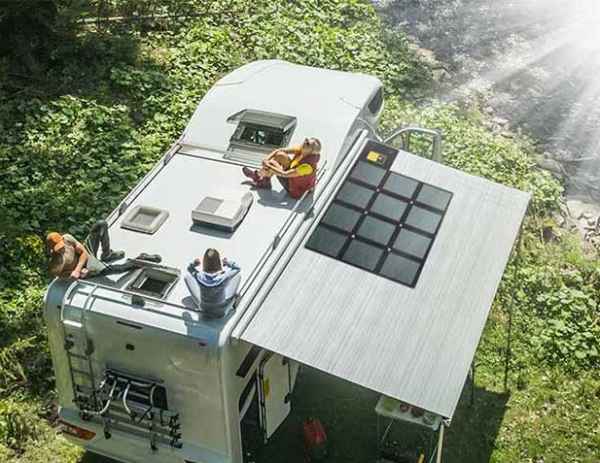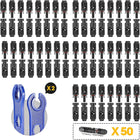Solar Blanket Vs. Panel: Which is Better for Summer Camping?

When camping, access to electricity is essential to keep your devices running, and solar energy has become an excellent power source. However, you might often hesitate to choose a solar panel or blanket, especially when you know them little.
In this article, we will discuss the difference between solar blankets and solar panels, their advantages and disadvantage, and which one you can choose for summer camping.
Without further ado, let’s discover now!
What is the Difference Between a Solar Panel and a Solar Blanket?
Solar panels are rigid, typically rectangular device that converts sunlight into electricity.
On the other hand, a solar blanket is a lighter, more flexible, and portable solar panel that can be folded down as small as a laptop size and carried anywhere. For example, BougeRV’s 100W 2.2kg CIGS portable solar blankets, equipped with a carry bag, are convenient to carry out just like you’re taking a lightweight laptop.
While solar panels are typically mounted on rooftops or fixed structures, solar blankets are perfect for camping, boating, or other outdoor activities. Both effectively harness the sun's energy and reduce reliance on traditional power sources.
Solar Blankets

Solar blankets are popular for camping enthusiasts who want to maximize the sunshine and harness its energy to power their devices. Made of lightweight and flexible solar cells, they can be easily folded and packed into a backpack. However, like any product, there are pros and cons to using a solar blanket for camping.
How Much Power Does a Solar Blanket Produce?
The amount of power a solar blanket can produce depends on several factors, including the solar blanket size, the amount of sunlight it receives, and the efficiency of the solar cells.
A solar blanket can produce between 100 to 500 watts per hour on average, depending on the above factors. This amount of power ensures a solar blanket to charge small electronic devices, such as smartphones and tablets, and small appliances, like a mini-fridge or a small fan.
Solar Blankets Pros
You can quickly move it from one location to another and use it in various settings, from camping trips to emergencies. Lightweight solar blankets are especially perfect if you’re a camper, backpacker, or hiker who doesn't want to lug around heavy batteries or generators.
Solar Blankets Cons
- Weather-dependent. Solar blankets require direct sunlight, meaning they might not work well on cloudy days or in shady areas. So, you need to adjust their location to ensure they get maximum sunlight.
Or, choose a solar blanket that has stable output during cloudy days. For example, some CIGS foldable solar blankets featuring diodes can generate more energy in shading or low-light conditions than monocrystalline silicon panels.
-
Limited power output. Solar blankets have a limited power output, which may not be ideal for charging larger devices like laptops. But they are best used for small appliances.
-
Slow charging. Charging devices with a solar blanket may be slow, particularly on cloudy days with less sunlight.
- Easy to be stolen. Solar blankets are light and can be tucked under your arm and walked away with. Solar blankets are usually more expensive than average monocrystalline panels, so you will feel worse off if stolen.
Solar Panels
What is a Solar Panel?
Solar panels also collect sunlight and convert it into electric current. They consist of different materials, including silicon, a common material for making solar cells. The solar cells are placed between two layers of protective material, usually glass or plastic, to create a durable and weather-resistant panel.
Solar panels can power homes, businesses, and even entire communities. They’re becoming increasingly popular as people look for ways to reduce their carbon footprint and save money on energy bills.

Fixed Solar Panels and Portable Solar Panels
Fixed solar panels are permanent installations mounted on rooftops or in open fields. Typically, they are attached to your vehicle, so you can power devices whenever on the road or parking at the campsite.
On the other hand, solar panels must be placed in direct sunlight to get the best results – which isn’t always possible in campsites.
Portable solar panels are a great choice if you’re on a budget and aren’t looking to travel regularly. Usually, they’re bulkier and heavier than their counterparts, but if you’re only away for several days and bringing just the essentials, portable solar panels shouldn’t be an issue. However, they might become a headache when traveling for longer!
Solar Panel Pros
Solar Panels Cons
- Bulkier and heavier.
- Solar panels need some setups.
- You must park your camping vehicle in full sunlight for the best results.
- Take up roof space that for surfboards.
- Solar panels need to run the cabling.
- Relatively fragile to break.
Solar Blanket Vs. Panel? Which One is Better for Camping?
We’ve learned the basic things about solar blankets and solar panels. But which one is better for camping? The answer ultimately comes down to what type of camper you are and your specific needs and budget.

Come Down to What Types of Camper You’re
A solar blanket is the better option for weekend campers who only need to charge a few devices. These lightweight and portable blankets can easily fit in a backpack and are set up in just a few minutes. They are also more affordable than solar panels, making them an excellent choice for those on a budget.
Regular campers with a 4x4 or camper trailer benefit more from a solar panel. These larger panels can produce more power, making them ideal for powering multiple devices or even running appliances. Though they’re more expensive than solar blankets, they are a worthwhile investment if you frequently go camping.
Solar panels are a must-have for full-time travelers and grey nomads. These campers rely on solar power to run their entire home on wheels, from charging devices to powering appliances and heating water.
In this case, investing in a high-quality solar panel system is essential for a comfortable and sustainable lifestyle on the road.
Depending on Your Specific Needs and Budgets
Ultimately, deciding between a solar blanket and a solar panel depends on your specific needs and budget. While a solar blanket is more convenient and affordable for some, a solar panel is a better long-term investment for those who frequently camp or live on the road.
Regardless of your choice, having a reliable solar power source will make your camping experience more enjoyable and sustainable.
BougeRV Portable Solar Blankets

BougeRV's portable solar blankets are the perfect solution if you love to explore the great outdoors while staying connected to the world.
-
The solar panels remain in good condition and keep working without any cracks after the thousand times collision during the trip. Made with advanced CIGS technology, the solar blankets are highly efficient, durable, and flexible.
-
With a power output of up to 100 watts, BougeRV’s solar blankets can quickly charge your RV's battery, power your devices like phones and cameras, and even keep your appliances running for extended periods.
-
BougeRV's solar blankets are lightweight and compact, making them easy to carry and set up anywhere. They are also weather-resistant so you can use them on a rainy and cloudy day.
-
BougeRV's solar blankets are eco-friendly because they collect clean and renewable energy without creating any harmful emissions. They are also cost-effective and take only about $450, reducing your reliance on traditional power sources and saving energy bills in the long run.
In short, BougeRV's portable solar blankets offer a convenient, efficient, and sustainable way to power your adventures.
Conclusion
After reading this blog, we’re sure you have the answer to choosing solar blankets or solar panels for your camping. As mentioned above, solar blankets and solar panels have advantages and drawbacks.
But, you can always choose between depending on your needs and what types of campers you’re! Would like to know more about solar solutions for camping, discover them now!
FAQs
1. Can you leave solar blankets in the rain?
Yes. Rain helps wash away the dust from the panel for better performance.
2. Can solar blanket power a fridge?
No. You can't charge a 12V fridge directly with a solar blanket. Instead, you can store the solar energy in a 12V battery and power the fridge off of that.















































































































































































































